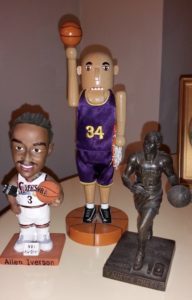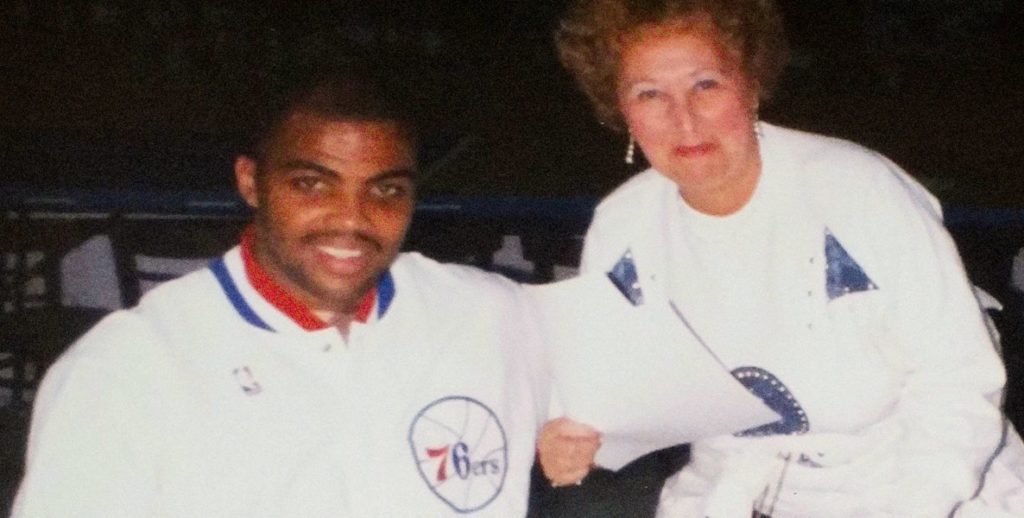Dear Sir Charles,
I want to tell you about my great-aunt, Shirley Rosenthal, who passed away in 2015 at the age of 88. I’d like to talk to you about her because she liked to talk to me—and everyone else—about you.
A career secretary, Aunt Shirley married my dad’s Uncle Norman and settled in the South Jersey suburbs, where she enjoyed her status as the “unofficial mayor” of her local swim club. She lived in a one-story ranch house with five small-but-cozy rooms— ahome if ever there was one. The few decorations in that home could be divided, almost exclusively, into three categories: family photos; elephant figurines; and Philadelphia 76ers memorabilia.
My aunt was a woman for whom small acts amounted to something major. Simple kindness was her currency. To her, your moments of kindness were solid as gold, and she treasured them as such, through all the days of her life.
You see, Chuck, Aunt Shirley loved the Sixers. She was a fan, man—the real deal. A season-ticket holder for many years, she cared about the guys on the team the way she cared about everyone at the swim club: like they were part of the neighborhood. On the table by her living room sofa stood a statuette of Mo Cheeks, an Allen Iverson bobble-head and—I’m not kidding—a Charles Barkley nutcracker. Even during the Sixers’ history-books bad seasons a few years back, she watched every game. Do you know what it’s like to watch every single game of a team that terrible? That’s how much my aunt loved her Sixers.
In her dining room, on a shelf, was a 5″x7″ photo album, worn in like a favorite pair of Converse All-Stars. The pictures show Shirley (with Uncle Norman behind the lens) at Sixers meet-and-greets in the mid-1980s. A beaming Aunt Shirl with Dr. J, Mo Cheeks, Moses Malone, Bobby Jones, Andrew Toney … and a young you.

She saw you at various events during your Sixers years, and she would tell folks—lots of folks—that several times you recognized her courtside and went over to hug her.
Those moments stayed with her, Chuck. She loved the Sixers, and boy did she love you. She talked about you with everyone as if you were her nephew. And I don’t mean while you were a player—I mean up until the day she died.
Some of her favorite Barkley moments happened when you returned to Philly while playing with Phoenix and Houston. Whenever your post-Sixers teams came to town, Aunt Shirley would be there next to Uncle Norman in their customary seats, holding posters she’d made for you. “WE LOVE & MISS YOU SIR CHARLES,” one said. “WE WANT YOU TO GET A RING. YOU ARE THE BEST.”
In my Aunt Shirley’s living room—a space roughly 10’x18’—were two couches, a large decorative cabinet, and some end tables and chairs. There’s not much space for stuff. Yet behind one of the chairs, Shirley reserved a square foot for two posters, wrapped in rubber bands, which she un-wrapped whenever anyone asked—and often even when they didn’t. They were the signs from those games, Chuck. They stayed in her living room for nearly two decades. Stayed there even after Shirley left this Earth.
![]()
What always interested me, whether as a writer or a relative, was what exactly you did to earn my aunt’s devotion.
I think it comes down to three things:
- You excelled on the court.
- You entertained off the court.
- In the few moments that you shared with her, you were warm, open, and kind.
That last one was the biggie. It’s the difference between my aunt telling people she “once met Charles Barkley” versus telling them, “Do you see him? That’s my Charles.”
You weren’t Charles Barkley to Shirley. You were Charles.
The fascination ordinary citizens have with athletes is a curious thing. Perhaps it’s that sports stars are our warriors, in a sense—the men and women we turn into heroes, the stories we spin into myths. Before Bird vs. Magic, there was Hector vs. Achilles. Or something like that.
The fascination ordinary citizens have with athletes is a curious thing. Perhaps it’s that sports stars are our warriors, in a sense—the men and women we turn into heroes, the stories we spin into myths. Before Bird vs. Magic, there was Hector vs. Achilles. Or something like that.
Whatever the reason for professional athletes’ influence in our culture, the sheer weight and power of that influence is undeniable. Since the days of Babe Ruth (and likely before), sports immortals have held a place of social importance similar to that of Hollywood icons.
To have this type of impact in a society can be a blessing—but not all superstars view it as such. Athletes, contrary to popular belief, are not obligated to be great people. Per your well-known comments, they don’t have to be role models. Pros are paid to achieve athletic victories, not moral ones.
All this is to say: Thank you for being a genuine human being. For being real. For taking a couple moments, at various points along two very different lines of life, to smile for a picture, throw an arm around a shoulder, and sign an autograph. I know these may seem like small acts, but famous people like you are asked to do them more often than seems reasonable, and I know it can’t always be fun. You should know that small acts add up—and that each one, although it may seem minor to you, can make a giant difference to someone else.
My aunt was a woman for whom small acts amounted to something major. Simple kindness was her currency. To her, your moments of kindness were solid as gold, and she treasured them as such, through all the days of her life.
I told my Aunt Shirley’s granddaughter, Rebecca, that I intended to write you a letter, and that if we were really lucky, you might even see it. Her eyes—so often tearful during the years since Shirley’s passing—lit up. “Oh, that would be great!” she said. “That would make Bubbie so happy, up there in the sky.”
It would make her happy. It would make her smile—and she had a great smile, all warmth and celebration, like a friend who hasn’t seen you in years.
Maybe you remember her smile, and maybe you don’t—it doesn’t matter. She remembered yours.
So on behalf of Aunt Shirley, and all the other Aunt Shirleys out there: Thanks, Chuck, for showing so many who you always truly were.
Sincerely,
Sam
A Philadelphia native, Sam Rosenthal has written about sports, politics, travel and life for a variety of publications. He currently is a Content Strategist for Clio, and is preparing his debut novel for publication. Follow him at @SamRoseWrites. This piece originally ran in The Cauldron.

